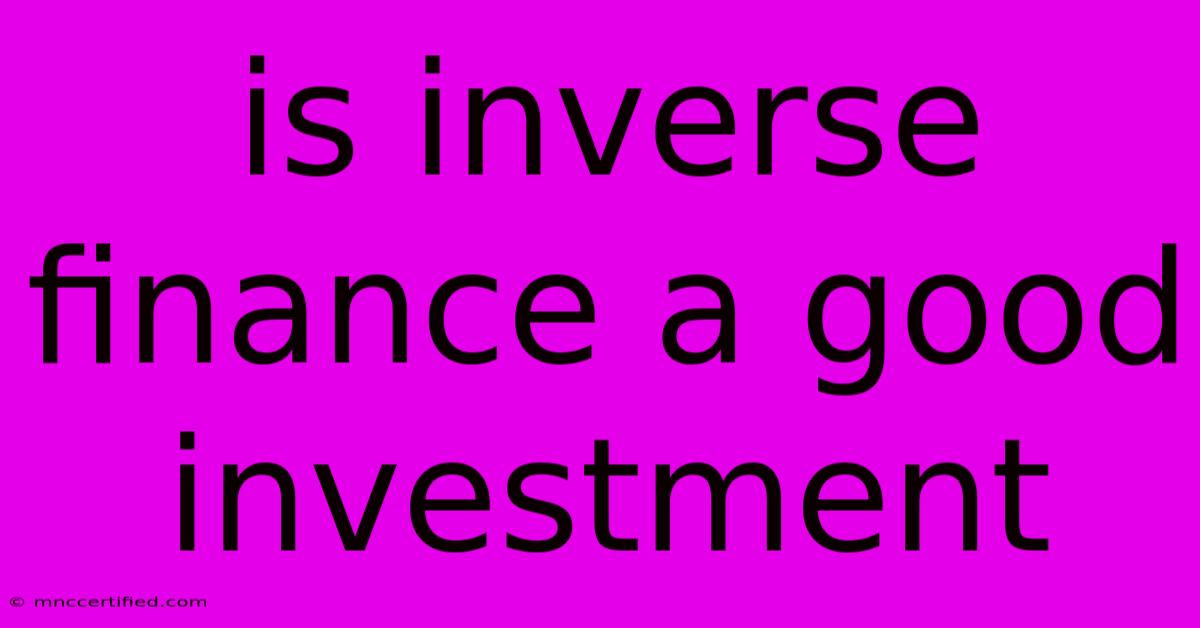Is Inverse Finance A Good Investment

Table of Contents
Is Inverse Finance a Good Investment? A Deep Dive into DeFi's Inverse World
The decentralized finance (DeFi) space is constantly evolving, introducing new and innovative protocols that offer unique investment opportunities. Inverse Finance, with its intriguing concept of inverse price-pegged tokens, has emerged as a prominent player in this burgeoning ecosystem. But is Inverse Finance a good investment? Let's delve into the details to understand the potential benefits and risks associated with this protocol.
Understanding Inverse Finance: A Primer
Inverse Finance is a DeFi protocol that utilizes inverse price-pegged tokens. These tokens are designed to move in the opposite direction of their underlying assets. For example, an inverse ETH token will increase in value when the price of ETH decreases. This unique mechanism offers potential benefits for investors looking to hedge against market volatility or profit from bearish market conditions.
Here's how it works:
- Inverse Tokens: Inverse Finance issues tokens pegged to the inverse price of underlying assets like ETH, BTC, or stablecoins.
- Collateralization: Users provide collateral, usually in the form of the underlying asset, to mint inverse tokens.
- Leverage: The inverse mechanism amplifies gains and losses, allowing for potential increased returns.
Potential Benefits of Investing in Inverse Finance:
- Hedging Against Volatility: Inverse tokens offer a way to mitigate risk by providing protection against potential price drops in the underlying assets.
- Profiting in Bear Markets: When the market is bearish, inverse tokens can generate significant profits due to their inverse price correlation.
- Leverage Opportunities: Inverse Finance's leverage mechanism allows for potentially amplified returns, though it comes with increased risk.
- Decentralized and Transparent: The platform operates on a decentralized network, eliminating intermediaries and ensuring transparency in its operations.
Risks Associated with Inverse Finance:
- Volatility: Inverse tokens are inherently volatile due to their inverse price correlation. This can lead to significant losses if the market moves against your position.
- Liquidation Risk: As with other DeFi protocols, users face liquidation risk if the value of their collateral falls below a certain threshold.
- Smart Contract Vulnerabilities: While the protocol is constantly audited, there is always the possibility of smart contract vulnerabilities that could lead to losses.
- Market Manipulation: The inverse price-pegged mechanism can be susceptible to market manipulation, potentially leading to significant losses.
Is Inverse Finance Right for You?
Whether or not Inverse Finance is a good investment depends on your individual risk tolerance, investment goals, and understanding of the DeFi space. If you are comfortable with high volatility and are looking to potentially profit from bearish markets, Inverse Finance might be worth considering. However, it's crucial to remember that this is a risky investment strategy and should only be pursued by experienced DeFi investors.
Before investing in Inverse Finance, consider the following:
- Do thorough research: Understand the protocol, its mechanics, and the potential risks involved.
- Start small: Invest only an amount of money you can afford to lose.
- Diversify your portfolio: Don't put all your eggs in one basket.
- Monitor your positions closely: Keep an eye on market movements and your collateral value.
Remember: Investing in DeFi is inherently risky and should be approached with caution. Always conduct your own research and consult with a financial advisor before making any investment decisions.
Conclusion
Inverse Finance offers an intriguing alternative for investors looking to capitalize on market volatility. Its unique inverse price-pegged mechanism allows for potential profits in bearish markets and provides a means of hedging against price drops. However, it's important to acknowledge the inherent risks associated with this protocol, including volatility, liquidation risk, and smart contract vulnerabilities. Ultimately, the decision of whether to invest in Inverse Finance depends on your individual risk tolerance and financial goals.

Thank you for visiting our website wich cover about Is Inverse Finance A Good Investment. We hope the information provided has been useful to you. Feel free to contact us if you have any questions or need further assistance. See you next time and dont miss to bookmark.
Featured Posts
-
Chase Mortgage Address For Insurance
Nov 11, 2024
-
Lying About Address On Car Insurance
Nov 11, 2024
-
Robbie Williams 2025 Tour Dates Venues Tickets
Nov 11, 2024
-
American Modern Motorcycle Insurance
Nov 11, 2024
-
Kevin Costners Future On Yellowstone
Nov 11, 2024